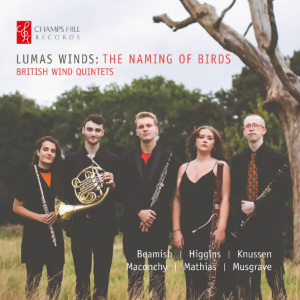
Lumas Winds: The Naming of the Birds
William Mathias (1934-1992)
Wind Quintet 1963
Oliver Knussen (1952-2018)
Three Little Fantasies (1970)
Elizabeth Maconchy (1907-1994)
Wind Quintet (1980)
Thea Musgrave (born 1928)
Wind Quintet (1992)
Sally Beamish (born 1956)
The Naming of Birds (2001)
Gavin Higgins (born 1983)
After Fallout . . . (2010)
Lumas Winds
rec. 2022, Music Room, Champs Hill, UK
Champs Hill Records CHRCD170 [73]
Wind quintets tend to be light-hearted affairs. The five instruments – flute, oboe, clarinet, bassoon and horn – have such different timbres and the fact that they are all single line instruments, meaning that chords will always be in mixed timbres, mean that the challenge of getting a work to sound well tends to be the most important part of the musical argument. There are impressive works for the medium, such as the quintets by Nielsen and Schoenberg, but, in general, wind quintets tend to be sophisticated entertainment music.
This is true of most but not all the works here, all by British composers of, roughly the last half century. All but the last, Gavin Higgins, have been familiar names to me though my acquaintance with their other works varies. Everything here is quite short, hence the fact that there are six of them on one disc.
We begin with the oldest work here, that by William Mathias, a composer I always find interesting and rewarding. His work is in five movements with a characteristically pungent and rhythmic opening, which in places anticipates that of his masterpiece, his third symphony. There follows a waltz in the Poulenc vein, a tricksy scherzo, and an elegy in a kind of acrid melancholy with a flurry of trills at the climax, and a final rather Stravinskian dance.
Oliver Knussen wrote relatively few works, but they are all jewel-like in the beauty and intricacy of their craftsmanship. His Three Little Fantasies derive from his Hums and Songs of Winnie-the-Pooh and were originally intended for young players. They are exquisite and short.
Elizabeth Maconchy is known to me as the composer a number of impressive but rather austere string quartets. Here she is in lighter mood. There are five movements, with a tiny scherzo at the centre. The opening features leaping figures and calls to attention. There follows a rather melancholy song-like movement. After the central scherzo there is another slow movement, more cheerful than the first, and the finale is a kind of unconfident dance.
The Musgrave’s work is the most impressive single work here. It is in four movements which play without a break and is predominantly dark and sinister. It begins with horn calls, followed by intensely expressive solos for the other instruments. The second section is also led by the horn and builds to a fearful climax and an anguished end. In the third section the bassoon leads a mournful elegy. The finale returns to some of the opening material with the tone now tragic. This is a serious and powerful work, almost too much so for the medium.
Sally Beamish’s The Naming of Birds, from which this disc takes its title, is completely different. The five movements each portray a bird, apart from the middle one which portrays two. Breamish’s bird imitations are lighthearted and playful and nothing like Messiaen’s versions of bird calls. Some of the movements call for squawks with the reed blown separately from the instrument.
Finally, Gavin Higgins’ After Fallout . . . is vigorous and attractive but somehow anonymous. I wish Lumas Winds had instead played one of Birtwistle’s wind quintets, Refrains and Choruses or Five Distances. Perhaps they are reserving them for a successor disc.
Lumas Winds are five young graduates from the London Conservatoires, and this is their first recording. Their playing is accomplished and convincing. And the Maconchy, Beamish and Higgins works are receiving their first recordings. Five of these works are civilized entertainment; Musgrave’s quintet is something more.
Stephen Barber
If you purchase this recording using a link below, it generates revenue for MWI and helps us maintain free access to the site



















